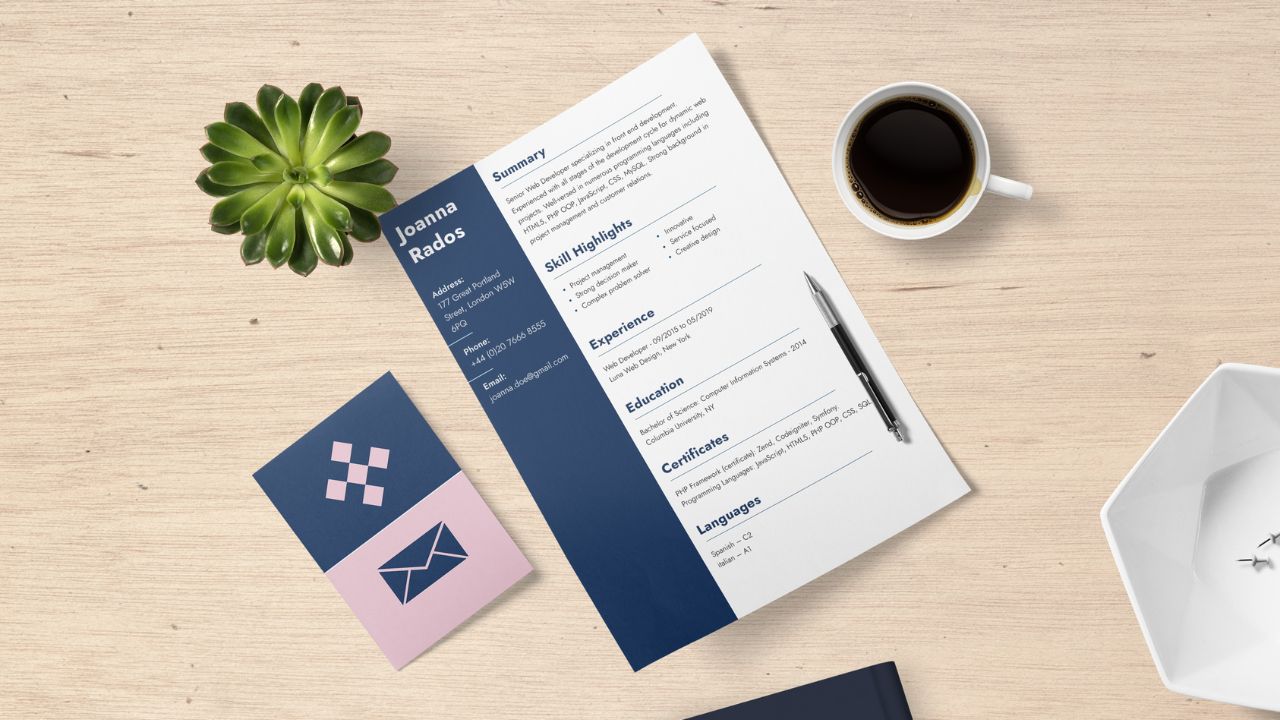In today’s competitive job market, your CV is more than a summary of experience; it’s your personal brand, your first impression, and often the deciding factor in whether you land an interview. By 2025, hiring practices will have evolved significantly. Employers now use Applicant Tracking Systems (ATS), AI-assisted screening tools, and skills-first hiring methods to filter through thousands of applications.
This means that a generic, outdated CV no longer works. To stand out, you need a CV that is clear, modern, and tailored, not only to the role but also to the way recruiters and technology review applications.
Understanding CV Trends in 2025
Skills-First Hiring
Many employers now prioritise skills over traditional degrees. Highlighting skills, both technical and soft, has become crucial.
ATS Optimisation
Around 90% of medium-to-large companies use ATS software. If your CV isn’t formatted and keyword-optimised, it may never reach a human recruiter.
Personal Branding
Employers increasingly look for candidates who demonstrate not just ability, but personality and values. A CV that communicates your unique strengths helps you stand out.
Structuring Your CV in 2025
A CV should be easy to read, logically structured, and tailored to the role. The standard sections include:
Contact Information
- Full name, phone number, professional email, and LinkedIn profile.
- Optional: Portfolio links (for creatives, tech professionals).
Professional Summary
A concise 3–4 sentence section summarising your experience, skills, and career goals. Focus on achievements and impact, not duties.
Key Skills
Highlight both technical and soft skills relevant to the role. Use bullet points for clarity.
Work Experience
- List in reverse chronological order.
- Focus on achievements, not just responsibilities.
- Use numbers, percentages, or outcomes where possible.
Education
Include degrees, certifications, or specialised training. For fresh graduates, this section can appear higher on the CV.
Additional Sections (Optional)
- Certifications: Industry-recognised qualifications.
- Volunteer Work: Especially if relevant.
- Languages: Useful in global or multicultural roles.
- Projects: Particularly for tech or creative industries.
Writing Each Section Effectively
Professional Summary Example
“Results-driven digital marketing specialist with 6 years of experience in SEO, content strategy, and paid media campaigns. Skilled in leveraging data analytics to increase online engagement by 40%. Seeking to contribute to innovative campaigns at a global agency.”
Key Skills Example
- Data Analysis (Excel, Python, SQL)
- Project Management (Agile, Scrum)
- Leadership & Team Collaboration
- Multilingual: English, Spanish, Hindi
Work Experience Example
Senior Software Engineer – TechCorp Pvt. Ltd. (2020–2025)
- Led a team of 8 developers to deliver a SaaS product, increasing client retention by 25%.
- Implemented automated testing, reducing software bugs by 30%.
- Mentored 5 junior engineers, improving team productivity.
How to Make Your CV ATS-Friendly
- Use standard headings (e.g., “Work Experience” instead of “Career Story”).
- Avoid graphics or tables—ATS may not parse them correctly.
- Use keywords from the job description naturally throughout your CV.
- Submit in the right format—PDF or Word depending on employer guidelines.
Common Mistakes to Avoid
- Overloading with jargon or buzzwords.
- Using the same CV for every job.
- Exceeding 2 pages (unless academic/technical).
- Including irrelevant details like hobbies (unless they add value).
- Typos or formatting errors.
Tailoring Your CV for Each Application
A one-size-fits-all CV no longer works. For every role:
- Review the job description.
- Identify key skills and responsibilities.
- Reorder or reword your CV to highlight the most relevant experience.
Example: If applying for a data analyst role, put “Data Analysis” at the top of your skills section and highlight related projects in work experience.
Design and Formatting Tips
- Use a clean, professional font (Arial, Calibri, Helvetica).
- Stick to size 10–12 for body text.
- Bold section headings for easy navigation.
- Use bullet points, not long paragraphs.
- Keep margins balanced with enough white space.
In 2025, many professionals use modern CV templates—minimalist designs that look professional while remaining ATS-friendly.
The Role of AI in CV Writing
AI tools now help tailor CVs by scanning job descriptions and suggesting keywords. Platforms like Rezi, Kickresume, and LinkedIn even generate CV drafts. These can save time but should always be edited to maintain a personal, human touch.
Employers value authenticity, and an over-reliance on AI-generated CVs can make applications feel generic. The best approach is to combine AI tools for efficiency with personal input for impact.
Final Checklist Before Submitting
- Is your CV tailored to the job description?
- Does it highlight skills clearly?
- Is it free of typos and grammar errors?
- Is the format ATS-compatible?
- Does it demonstrate achievements rather than just responsibilities?
A CV in 2025 is not just a list of jobs; it is your personal marketing document. With employers using AI screening tools and focusing on skills-first hiring, your CV must be tailored, clear, and achievement-focused.
By highlighting relevant skills, optimising for ATS, and presenting your achievements with measurable results, you can create a CV that doesn’t just pass the initial scan but grabs the recruiter’s attention.
Remember: the goal of a CV is not to get you the job, it’s to get you the interview. From there, your skills, personality, and preparation will do the rest.








Leave a Comment